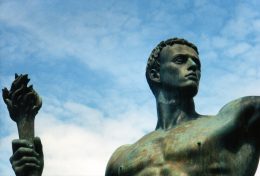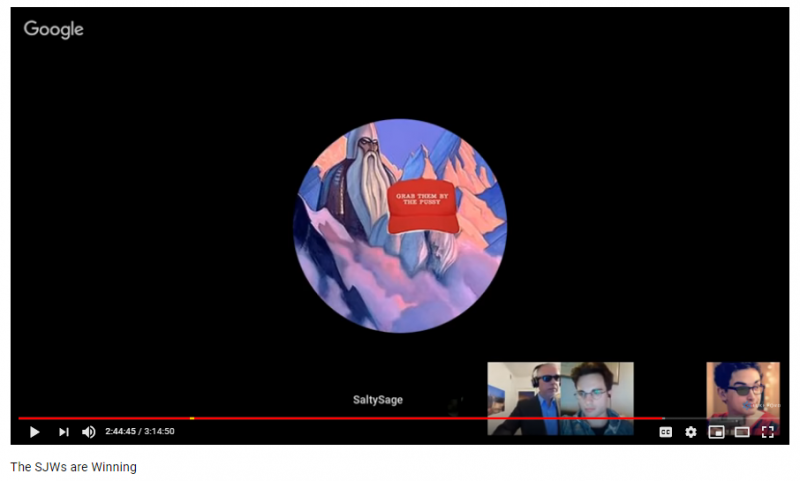|
[Majorityrights Central] “It’s started. You ignored us. See where it’s going to get you.” Posted by Guessedworker on Sunday, 04 May 2025 00:42. [Majorityrights News] Another dramatic degradation of Russia’s combat capacity Posted by Guessedworker on Wednesday, 23 April 2025 08:49. [Majorityrights Central] A British woman in Ukraine and an observer of Putin’s war Posted by Guessedworker on Monday, 14 April 2025 00:04. [Majorityrights News] France24 puts an end to Moscow’s lie about the attack on Kryvyi Riy Posted by Guessedworker on Monday, 07 April 2025 17:02. [Majorityrights News] If this is an inflection point Posted by Guessedworker on Thursday, 03 April 2025 05:10. [Majorityrights News] Sikorski on point Posted by Guessedworker on Friday, 28 March 2025 18:08. [Majorityrights Central] Piece by peace Posted by Guessedworker on Wednesday, 19 March 2025 08:46. [Majorityrights News] Shame in the Oval Office Posted by Guessedworker on Saturday, 01 March 2025 00:23. [Majorityrights News] A father and a just cause Posted by Guessedworker on Tuesday, 25 February 2025 23:21. [Majorityrights Central] Into the authoritarian future Posted by Guessedworker on Friday, 21 February 2025 12:51. [Majorityrights Central] On an image now lost: Part 2 Posted by Guessedworker on Saturday, 15 February 2025 14:21. [Majorityrights News] Richard Williamson, 8th March 1940 - 29th January 2025 Posted by Guessedworker on Monday, 03 February 2025 10:30. [Majorityrights Central] Freedom’s actualisation and a debased coin: Part 2 Posted by Guessedworker on Saturday, 11 January 2025 01:08. [Majorityrights News] KP interview with James Gilmore, former diplomat and insider from first Trump administration Posted by Guessedworker on Sunday, 05 January 2025 00:35. [Majorityrights Central] Aletheia shakes free her golden locks at The Telegraph Posted by Guessedworker on Saturday, 04 January 2025 23:06. [Majorityrights News] Former Putin economic advisor on Putin’s global strategy Posted by Guessedworker on Monday, 30 December 2024 15:40. [Majorityrights News] Trump will ‘arm Ukraine to the teeth’ if Putin won’t negotiate ceasefire Posted by Guessedworker on Tuesday, 12 November 2024 16:20. [Majorityrights News] Olukemi Olufunto Adegoke Badenoch wins Tory leadership election Posted by Guessedworker on Saturday, 02 November 2024 22:56. [Majorityrights News] What can the Ukrainian ammo storage hits achieve? Posted by Guessedworker on Saturday, 21 September 2024 22:55. [Majorityrights Central] An Ancient Race In The Myths Of Time Posted by James Bowery on Wednesday, 21 August 2024 15:26. [Majorityrights Central] Slaying The Dragon Posted by James Bowery on Monday, 05 August 2024 15:32. [Majorityrights Central] The legacy of Southport Posted by Guessedworker on Friday, 02 August 2024 07:34. [Majorityrights News] Farage only goes down on one knee. Posted by Guessedworker on Saturday, 29 June 2024 06:55. [Majorityrights News] An educated Russian man in the street says his piece Posted by Guessedworker on Wednesday, 19 June 2024 17:27. [Majorityrights Central] Freedom’s actualisation and a debased coin: Part 1 Posted by Guessedworker on Friday, 07 June 2024 10:53. [Majorityrights News] Computer say no Posted by Guessedworker on Thursday, 09 May 2024 15:17. [Majorityrights News] Be it enacted by the people of the state of Oklahoma Posted by Guessedworker on Saturday, 27 April 2024 09:35. [Majorityrights Central] Ukraine, Israel, Taiwan … defend or desert Posted by Guessedworker on Sunday, 14 April 2024 10:34. [Majorityrights News] Moscow’s Bataclan Posted by Guessedworker on Friday, 22 March 2024 22:22. [Majorityrights News] Soren Renner Is Dead Posted by James Bowery on Thursday, 21 March 2024 13:50. [Majorityrights News] Collett sets the record straight Posted by Guessedworker on Thursday, 14 March 2024 17:41. [Majorityrights Central] Patriotic Alternative given the black spot Posted by Guessedworker on Thursday, 14 March 2024 17:14. [Majorityrights Central] On Spengler and the inevitable Posted by Guessedworker on Wednesday, 21 February 2024 17:33. [Majorityrights News] Alex Navalny, born 4th June, 1976; died at Yamalo-Nenets penitentiary 16th February, 2024 Posted by Guessedworker on Friday, 16 February 2024 23:43. US Signs Genocide Prevention Act, but will it act on genocide of assimilation & gradual replacement?
BBC, “May’s government survives no confidence vote”, 17 Jan 2019. BBC, “Brexit: Theresa May says MPs must ‘work together’ to deliver Brexit”, 17 Jan 2019.
May loses Brexit vote - what happens next?
 United States Border Patrol at Algodones Sand Dunes, California, USA. The fence on the US-Mexican border is a special construction of narrow, 15 feet tall elements, that are movable vertically. This way they can be lifted on top of the ever shifting sand dunes (image Public Domain, Wikipedia). United States Border Patrol at Algodones Sand Dunes, California, USA. The fence on the US-Mexican border is a special construction of narrow, 15 feet tall elements, that are movable vertically. This way they can be lifted on top of the ever shifting sand dunes (image Public Domain, Wikipedia).Lest there be any misunderstanding, the position here is that the matter of a United States Southern border wall, fence, whatever, as any requirement of border control, is very important. Border control there is particularly illustrative of a central matter, which is that border control is crucial to the management of populations in human and pervasive ecology; issues which include territorial carrying capacity - hence, at this border, the particular demographic is a secondary matter; salient there is the matter of Mexico’s massive population - Mexico City being among the most overpopulated cities in the world. Nevertheless, the demographic and rule structure of The United States is already on a disastrous trajectory for Whites, will remain so, even with a wall on the south border. While border control is essential at any rate, the worst case scenario of its instantiation would be that it will be used to lull complacency of propositional conservatism - “we Americans all being in the same relatively taken-care-of boat” - and further close us in and galvanize us into mulattoization; furthering the trajectory of those who left us susceptible for the Cartesian rule structure of the constitution and to the Jewry which weaponized it against our necessary discrimination both at the border and within the borders. ...galvanizing us with the demographic upshot of this manipulation unfortunately against a population that does have some warrant as native American behind them and which, for their nature, is highly ethnocentric. It is a demographic thus, which has been effective against integration with blacks, against integration with Whites, indifferent to Jewish violin playing; as such, in the most optimistic scenario, could be allied with other Asians and Whites against black power, Jewish supremacism and Islamic imposition over human ecological coordination (agreed, getting Mestizos to cooperate in ecological management is no small trick; perhaps Asians proper could help reason, coordinate and enforce such management). Failing that is a default “alliance” by contrast in sudden, “conservative” implementation against Meztiso populations that looks suspiciously in line with Jewish interests against an Asian, Mestizo, White alliance as it would resist continued instigation of the Mulattoization of the broad mass of American Whites, while allying Jewry with increasingly rare White sell-out elites; whose precarious situation would be more and more prone to interbreeding with Jewry or the Mulatto mass.
 Arno Breker, Die Partei: “Hunky” image from “the Reich.” Thimple but it thayth it. Arno Breker, Die Partei: “Hunky” image from “the Reich.” Thimple but it thayth it.
Aren’t you so eager to join this movement? LOL!
DanielS in the enemy camp, continually hesitant, but inserts time bombs to bring down their campaign DanielS goes into the enemy camp, continually hesitant, but inserts the time bombs that will bring down their campaign against White sovereignty and systemic homeostasis. I’ve never seen Luke Ford so stressed (as I did the first time that I hung out with him briefly at the end of a hangout) and I’ve never seen him look so glum (the second time, when he gave me the floor with just him as an interlocutor). Actually, I take no delight in that. I’m sure that he felt pressure given his own position in defense of Jewry and from the Jewish friendly community around him to try to limit my message exposing the “objectivist” anti-“left” marketing campaign. Even so, I was able to say around 80% of what I’d planned - and some ideas will act like time bombs having gotten in there. This was my first “HANGOUT” and not having opportunity to practice and get feedback as to how I might sound beforehand, I did not realize how persistently hesitant I was and how it was coming across. It was hard even for me to listen to myself the first time around in this uniquely bad delivery of mine. I hesitate constantly, but nevertheless, the content is there and I realized that the second time around listening to it - that it wasn’t all that bad for that reason. I take solace in the fact of knowing that I don’t have to speak that way and don’t usually, in normal conversation. I was in enemy territory, resources at risk, and that is cause for hesitation. But knowing that my position and resources are robust, it was alright to go ahead - I know that my program works now, it can’t be destroyed by the enemy. The best they can hope to do is distract from it, obstruct and try to bury it.
I am honestly not happy to see Luke looking so glum. It’s telling that he adds a link to Cofnas’ critique, like holy water against a goyim assault (I wasn’t impressed by Cofnas’ critique, BTW).  I come on at (2:20:47) and am confronted by Bob, the “bad cop”, the one with one dark eye-glass, lower right. I come on at (2:20:47) and am confronted by Bob, the “bad cop”, the one with one dark eye-glass, lower right.I had tested the water with him a few days before, on the evening of December 30th, in a Hangout called the “Victory of Social Justice Warriors.” Seeing the Jewish sponsored meme that’s been promoted since 2008 - you don’t want any of that social justice warring, do you? - I saw it as occasion to join the conversation, which I do, late in the hangout (2:20:47) having just woken up (I’m in a completely different time zone).  (((Kyle))), comes on and tries to intimidate me with a strawman soliloquy (((Kyle))), comes on and tries to intimidate me with a strawman soliloquy They had a little test or trap (depending upon how you look at it) waiting for me - three antagonistic, young interlocutors. One Jewish kid named (((Kyle))) was supposed to intimidate me with his brilliance. (((Kyle))) is a rather simple fellow, really, even if he can elaborate extensively on his simple cause - advocating his Jewish people (down with their program against “the left”). He interrupted my flow and straw manned me with soliloquys (he acted like I was “confused” - a typical Jewish canard), to clear up my “confusion” about Cochran, making some big deal about how I supposedly didn’t understand Cochran when he knew nothing about what I know, with my having made a few offhand, half joking remarks not intending any elaboration.  Luke Ford flanked by his good cop/bad cop Luke Ford flanked by his good cop/bad copThen came a little “good cop /bad cop” pair against me. This Bob guy, goy, a Christian of the “irony bro” ilk (Irony Bro means obnoxious trolling with no pretense of trying to understand what the person you are trolling is trying to say, just bury them). Bob is the one with one dark eye glass - a flaming asshole who was attempting to bludgeon me with antagonism from the get go - “here, take this I.Q. test while you are waiting.” Sure Bob, I’ll do that. “Everything you say comes from 4-Chan” - going to show how he knew nothing about me, whipping out a comment perhaps applicable to Andrew Anglin. I have been to 4-chan briefly two or three times and derive literally none of my ideas from it; but that is the kind of immediate accusation this guy was rendering. He went on to say, “I can understand nothing you say” ...I rejoined that maybe his I.Q. isn’t high enough, idiot. (bad cop)  Salty Sage the “good cop” who tries to tell me that he’s on my side - yeah, right. Salty Sage the “good cop” who tries to tell me that he’s on my side - yeah, right.At the same time they had this other guy, “Salty Sage”, who claimed to be on my side. I don’t know where his two comments are now; but in the hangout and comments, Salty Sage would “kindly”, condescendingly, ‘re-interpret’ me for the others to understand on “friendly terms”. Then he added in the comments, that my “misdirection” (tries to turn the game around on me, as if I am the one giving misdirection, not Jewry; no, Salty Sage, I am the one diagnosing mis-direction), he tries to suggest that I am the one that is giving misdirection and that he sees it “sympathetically” as stemming from necessary contortions of circumstance.. When I called attention to the fact that Gottfried instigated this marketing campaign against “the left”, another “friend”, Ruston, said that I had a thing against Gottfried, thinks he’s great, and that everyone should read him. Then Salty Sage says he’s on my side (good cop). He groans when I say that Christianity is bullshit, then says he’s on my side (good cop Salty Sage is “on my side”, yeah right). Anyway, that’s the context of my first hangout with Luke:(2:20:47); I make a few points that I don’t make in my subsequent talk, which is mostly me talking and Luke adding a few rejoinders. I didn’t get to say half of what I’d like to say, but the chat encouraged Luke to use the plausible excuse of my bad delivery to prevent me from subverting their position any further. Listen here: DanielS from Majorityrights talks with Luke on the topic of whether Jews are good for Western Civilization (and Europeans generally); you can listen here or Download the MP3: https://soundcloud.com/luke-ford-666431593/are-jews-good-for-western-civilization - Pinned by Luke Ford.  Brundlefly Brundlefly Norvin Hobbs Norvin HobbsOne of Luke‘s frequent guests, “Brundlefly” (Jewish wife, Jeff Goldblum Avitar) tries his best to put the damper on my position in the comments (which I re-post under the fold) and was probably one of those who got Luke to shut down the discussion more quickly than he normally would (Luke typically allows discussions to go on for a couple hours and I had expected to say all I had planned to say, but wasn’t given the time). Brundedlefly starts-off amicably enough, while giving away the fact that he knows nothing about me, given his surprise that I am familiar with Norvin Hobbs.
After some commentators who agree with me that Jewry is NOT good for Western Civilization, things get more antagonistic and I defend myself. Only two people seem to be directly on my side, “Kat Ruby” and “Jewel Citizen”, who seems almost like Soren Renner, but I’m not sure who it is….
Related at Majorityrights: Israel cajoles a drunken EU, confused of its identities, to sign-on to accepting African migration.
Page 90 of 230 | First Page | Previous Page | [ 88 ] [ 89 ] [ 90 ] [ 91 ] [ 92 ] | Next Page | Last Page |
|

Existential IssuesDNA NationsCategoriesContributorsEach author's name links to a list of all articles posted by the writer. LinksEndorsement not implied. Immigration
Islamist Threat
Anti-white Media Networks Audio/Video
Crime
Economics
Education General
Historical Re-Evaluation Controlled Opposition
Nationalist Political Parties
Science Europeans in Africa
Of Note MR Central & News— CENTRAL— Piece by peace by Guessedworker on Wednesday, 19 March 2025 08:46. (View) Into the authoritarian future by Guessedworker on Friday, 21 February 2025 12:51. (View) On an image now lost: Part 2 by Guessedworker on Saturday, 15 February 2025 14:21. (View) — NEWS — If this is an inflection point by Guessedworker on Thursday, 03 April 2025 05:10. (View) Sikorski on point by Guessedworker on Friday, 28 March 2025 18:08. (View) Shame in the Oval Office by Guessedworker on Saturday, 01 March 2025 00:23. (View) CommentsJames Marr commented in entry 'Soren Renner Is Dead' on Fri, 05 Apr 2024 20:02. (View) James Marr commented in entry 'Soren Renner Is Dead' on Fri, 05 Apr 2024 13:22. (View) Thorn commented in entry 'Soren Renner Is Dead' on Thu, 04 Apr 2024 23:37. (View) James Marr commented in entry 'Soren Renner Is Dead' on Thu, 04 Apr 2024 13:41. (View) Thorn commented in entry 'Moscow's Bataclan' on Thu, 04 Apr 2024 11:16. (View) Thorn commented in entry 'Moscow's Bataclan' on Thu, 04 Apr 2024 11:11. (View) Thorn commented in entry 'Moscow's Bataclan' on Thu, 04 Apr 2024 11:09. (View) Al Ross commented in entry 'Moscow's Bataclan' on Thu, 04 Apr 2024 05:03. (View) Al Ross commented in entry 'Moscow's Bataclan' on Thu, 04 Apr 2024 03:28. (View) Al Ross commented in entry 'Moscow's Bataclan' on Thu, 04 Apr 2024 03:11. (View) Guessedworker commented in entry 'Moscow's Bataclan' on Thu, 04 Apr 2024 00:16. (View) Thorn commented in entry 'Moscow's Bataclan' on Wed, 03 Apr 2024 23:12. (View) Guessedworker commented in entry 'Moscow's Bataclan' on Wed, 03 Apr 2024 22:34. (View) Thorn commented in entry 'Moscow's Bataclan' on Wed, 03 Apr 2024 17:52. (View) Thorn commented in entry 'Moscow's Bataclan' on Wed, 03 Apr 2024 11:36. (View) Thorn commented in entry 'Soren Renner Is Dead' on Sat, 30 Mar 2024 23:34. (View) James Bowery commented in entry 'Soren Renner Is Dead' on Sat, 30 Mar 2024 22:43. (View) Guessedworker commented in entry 'Soren Renner Is Dead' on Sat, 30 Mar 2024 17:16. (View) Thorn commented in entry 'Soren Renner Is Dead' on Sat, 30 Mar 2024 15:22. (View) Guessedworker commented in entry 'Soren Renner Is Dead' on Sat, 30 Mar 2024 13:51. (View) Thorn commented in entry 'Soren Renner Is Dead' on Sat, 30 Mar 2024 13:16. (View) Guessedworker commented in entry 'Soren Renner Is Dead' on Sat, 30 Mar 2024 13:09. (View) Thorn commented in entry 'Soren Renner Is Dead' on Sat, 30 Mar 2024 12:34. (View) Guessedworker commented in entry 'Soren Renner Is Dead' on Sat, 30 Mar 2024 11:40. (View) Al Ross commented in entry 'Soren Renner Is Dead' on Sat, 30 Mar 2024 09:27. (View) Al Ross commented in entry 'Soren Renner Is Dead' on Sat, 30 Mar 2024 09:20. (View) Al Ross commented in entry 'Moscow's Bataclan' on Sat, 30 Mar 2024 06:56. (View) Al Ross commented in entry 'Moscow's Bataclan' on Sat, 30 Mar 2024 06:43. (View) Guessedworker commented in entry 'Soren Renner Is Dead' on Sat, 30 Mar 2024 05:39. (View) Thorn commented in entry 'Soren Renner Is Dead' on Fri, 29 Mar 2024 21:55. (View) James Bowery commented in entry 'Soren Renner Is Dead' on Fri, 29 Mar 2024 17:12. (View)  
|